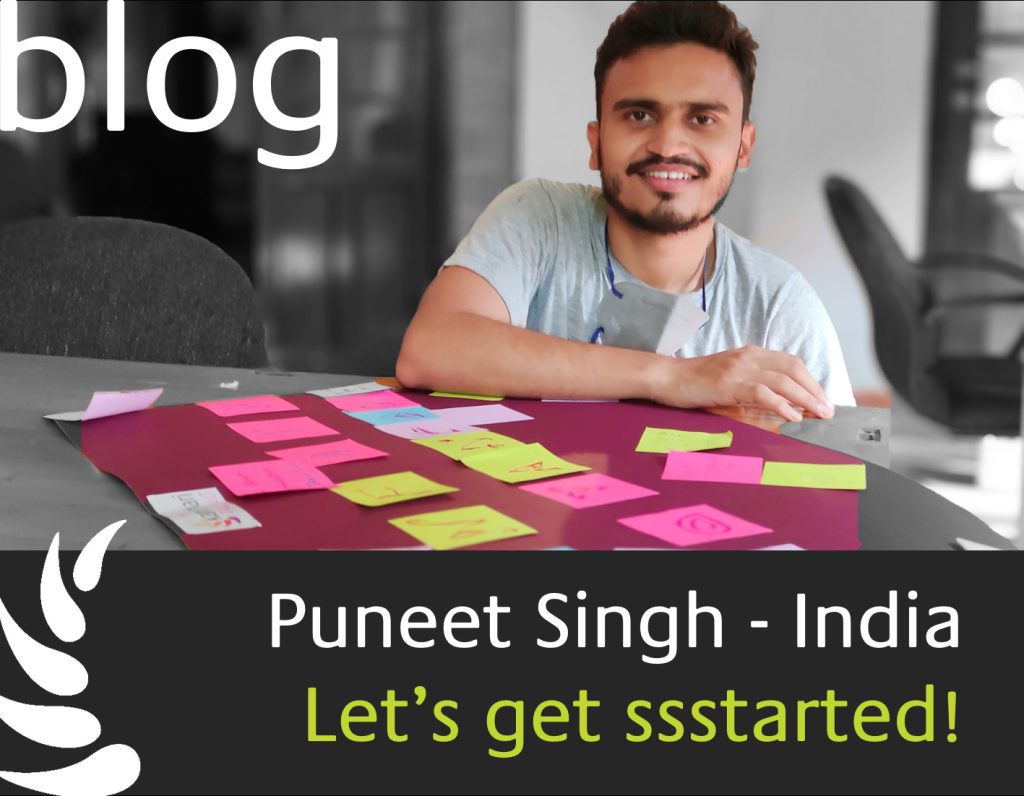A Special Style of Co-Co-Communication
Puneet Singh Singhal is from New Delhi, India. Witnessing violence in his personal surroundings shook him and took him to an island of isolation and loneliness. From a child who loved to be in the spotlight, he changed into a stammering, timid boy who tried to avoid conversation. Today, Puneet embraces his special style of communication, and through his organization ssstart, he dreams to set free those who are prisoners of their inability to communicate fluently.
As a little child, life was beautiful. I remember, when I started my schooling, that it was so much fun learning English and Hindi alphabets, mathematics, and drawing. I used to recite prayers and sing the national anthem in the school assembly. In classes, I was the one who read the mathematics table aloud as my classmates repeated after me.
But then everything changed when I witnessed violence amongst adults for the first time. I felt wounded and yet so numb that I used to stand in one place for hours without having a single thought. I found myself in shackles. Before, I was scared to sit in the dark, but at this point, I found refuge in darkness.
I stopped communicating. When I was asked a question, my words wouldn’t come out. The school stage that used to be my comfort zone changed into a “battlefield”.
One day, the whole class started to stammer “gu-gu-gu-good morning”, and I realized that they were mocking me.
My classmates and their parents even complained to the principal that I could be a bad influence and make all of them stammerers. My mother couldn’t believe that her son, whose tongue was as fast as a train and sharp as a razor, was struggling with his speech! Being subjected to constant mocking, I completely lost my confidence.
I used different strategies to ease my stammering: finding alternatives for words I generally got stuck on, reducing my statements to a minimum, or arriving late to avoid introducing myself.
When people tried to help by asking me to slow down or by finishing my sentences, it made me even more conscious. And then there were these weird and rather dangerous advice, like licking ashes of cremated bodies or rubbing alum on the tongue until the upper layer was removed. Looking back, my childhood was not easy, but do I regret having a stammer? No. It made me a more sensitive human being. I feel connected with all who are unable to express their thoughts and long to be understood.
In the summer of 2018, I got in touch with Vinayak, a man who needed almost 7 minutes to introduce himself. He was from The Indian Stammering Association (TISA), and he invited me to attend the annual conference in Delhi. When I listened to the speakers, I was amazed by how confident and comfortable they were while speaking in public. Soon enough, I found myself among my “tribe”, and now we were the ones who made fun of our inabilities, or shall I say, our special style of communication!
For the first time, I didn’t have to run away from myself.
The next day, we got a task to talk to passengers in the Delhi metro. We explained our challenges and how we felt being ridiculed. People listened to us and signed a pledge to be considerate towards anyone facing a communication problem.
All this helped me to attain a state of harmony with myself and to accept that I was a stammerer. Now I could take control of my life, as I realized I was not alone. And BOOM! I jumped back on stage again and took every opportunity to fail miserably, more than ever before. But I did learn one thing: I can now say my name fluently, a name that starts with “Pu”—a sound I had always struggled with.
In my hometown, New Delhi, I plan to create a centre called ssstart.
It will be a place of communication. We will offer workshops like the following:
1. What’s the hurry workroom: Here, we work with stammerers, lispers, and people with other speech disorders. Our motive is not to treat them but to let them move on in life and give them the techniques to cope with different challenges. We also nudge them to become better listeners.
2. Body without blah-blah: Non-verbal communication is significant in our interactions. Eye contact, facial expressions, gestures, and posture are part of what we call “body language”. In this workshop, we will help participants to explore various forms of non-verbal communication.
3. Sign-up to know more workshop: Here, we explore possibilities and dive deep into sign language and braille, and how such communication tools can be instrumental in activating new aspects of communication.
4. Life on stage: Public speaking is the most common fear among people worldwide. In this workshop, we help our participants overcome stage fright through ice-breaking activities, vocal exercises, and by creating opportunities to face the public without getting afraid. We aim to make the stage their comfort zone and liberate them from this fear.
There are many organizations in the US, UK, India, and the rest of the world tackling these issues. They are creating awareness and raising voices to increase acceptance among stammerers and among other people. However, they don’t allow non-stammers to join their organization. If they did, non-stammerers could be better sensitized to our challenges. Also, there is a need to create a new attitude in society to normalize stammering and other speech disorders. Let’s ssstart!
“We all have two lives. The second starts when we realize we have only one” – Confucius.
So, what are you going to do with yours?
If you, like Puneet want to make a difference by starting your own organisation,
then apply today to become a kanthari participant: apply via https://www.kanthari.org/



